AI Content Generator
Automate your content creation with URLsLab’s AI Content Generator for WordPress. We can connect WordPress with FlowHunt and automate content creation using AI models like GPT-3.5 and GPT-4. Generate high-quality, unique content at scale with ease.

What is the AI-assisted content creator?
The AI-Assisted Content Creator by URLsLab is an advanced tool utilizing GPT models to automate and customize high-quality content creation, catering to a wide range of digital needs for enhancing online visibility.
How it works
Initiated through a simple WordPress shortcode integration, the AI-Assisted Content Creator generates unique text based on user-defined prompts, offering customization options such as language and content length. This streamlined process supports both bulk and tailored content production, efficiently boosting digital presence.
Generator
The Generator serves as the foundational element of the AI-Assisted Content Creator, purpose-built to facilitate automated blog creation. This function is divided into two distinct operational modes: the Manual AI Generator and the Scalable AI Generator, each designed to accommodate varying content generation needs.
Manual AI Generator
First step – Page title and keywords
The Manual AI Generator process begins with the user specifying the webpage title and the primary keyword for the article, along with a target country selection. Upon input, URLsLab identifies and presents a list of keywords relevant to the article, from which users can select either a subset or the entirety for inclusion.
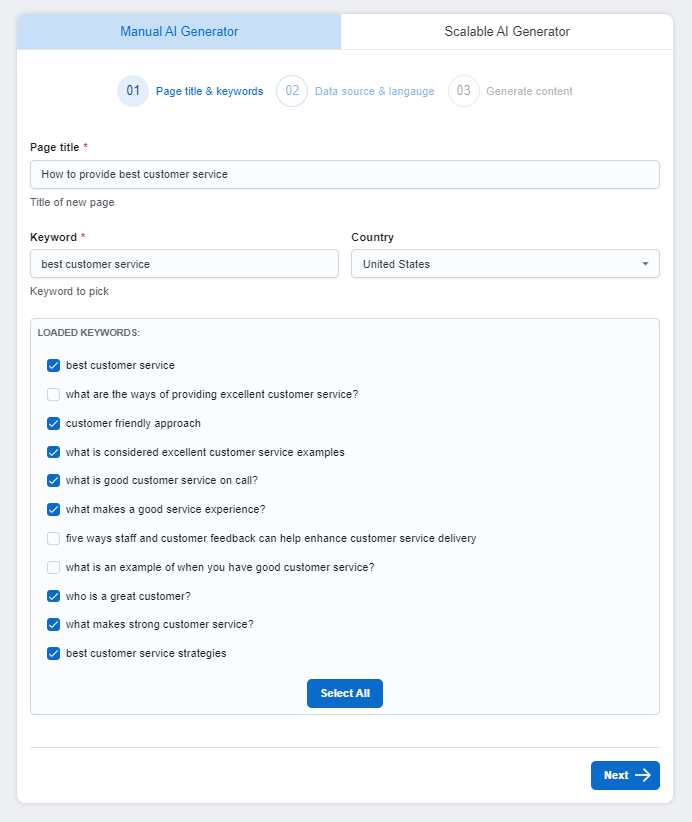
Second step – Data source and language
In the subsequent step, users are presented with multiple data source options to tailor the content generation process:
- No data source: Content is generated purely based on user-provided prompts without additional context.
- URL data source: Content is influenced by information extracted from specified URLs, enhancing relevance.
- Domain data source: Content draws from data across the specified domain for a comprehensive approach.
- Google search source: Utilizes current SERP data for content that is original and highly relevant, based on primary and similar keywords. We recommend using this data for the most updated and relevant content creation.
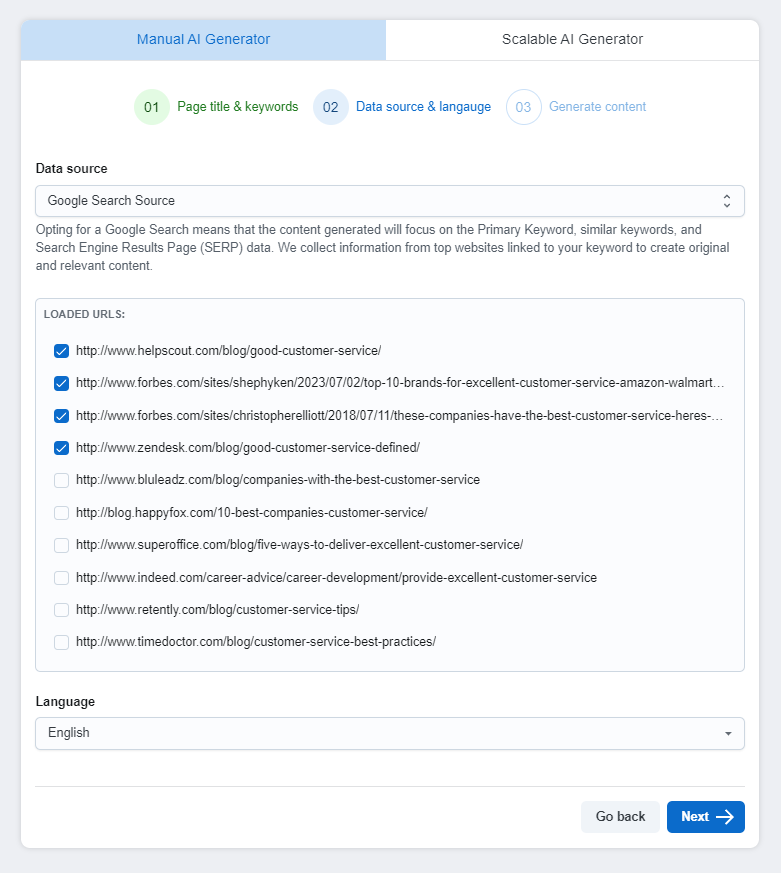
Third step – Generate content
Users then select a prompt (either manually entered or chosen from templates) and an AI model. While customization is an option, new users, particularly those unfamiliar with SEO, are encouraged to utilize pre-existing templates.
Following prompt selection, pressing “Generate Text” prompts URLsLab to craft content tailored to the inputs provided. It is advisable to refine and edit the AI-generated content to ensure it provides added value and achieves a strong SEO ranking.
URLsLab also supports these variables:
- {keywords}
- {primary_keyword}
- {title}
- {language}
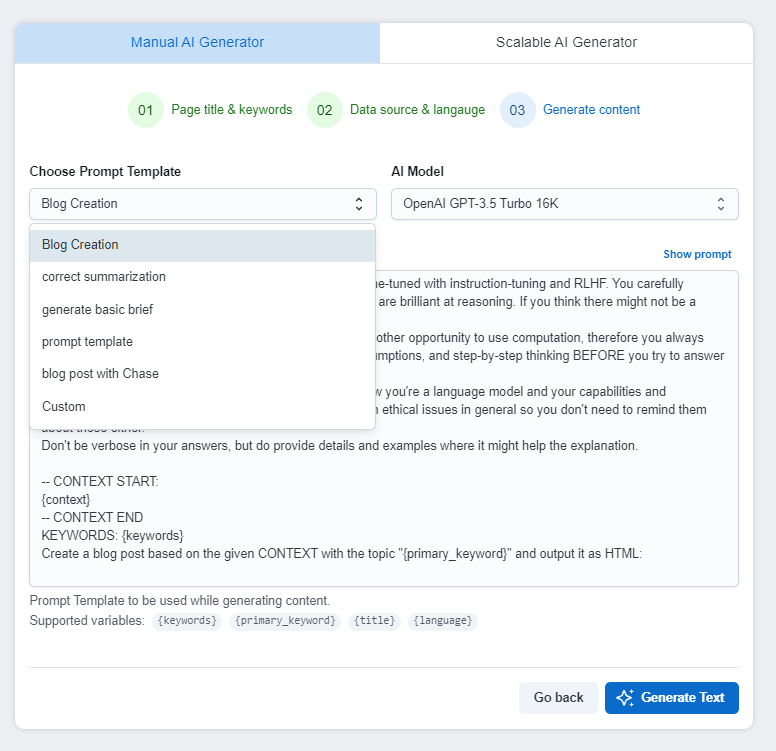
After reviewing the text, you can create a post by simply clicking “Create post”. URLsLab will take care of the rest and create a post in your WordPress dashboard.
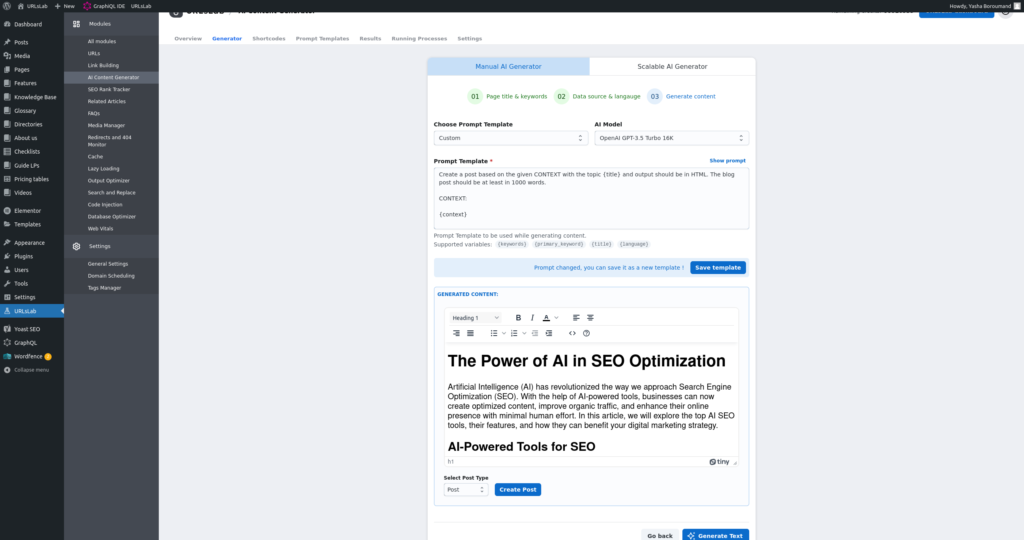
Scalable AI generator
There is also a second option to create AI-assisted content with URLsLab. The difference is that the content is generated in two steps instead of three, and the keywords aren’t automatically generated. At the beginning of the Scalable AI Generator process, you can input keywords manually from your own research, or import them as a .csv file.
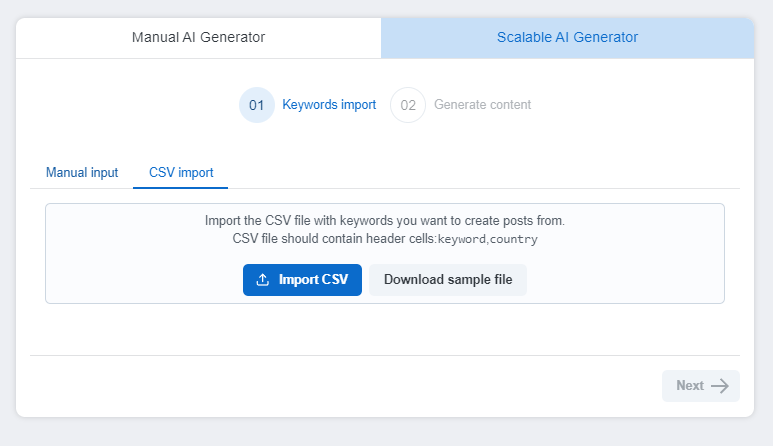
The next step is the same as for the Manual AI Generator. You can craft the prompt, generate the content, and publish it on your page.
Shortcodes section
The AI Generator shortcode defines the text generation process within a specific shortcode location. These shortcodes can be incorporated within a WordPress template or added as a single code to the page editor. As soon as the shortcode appears on the page and text is generated, it’s replaced by the actual text. When the shortcode is displayed for the first time, it’s replaced with empty text, and a new generator task is dispatched to a queue.
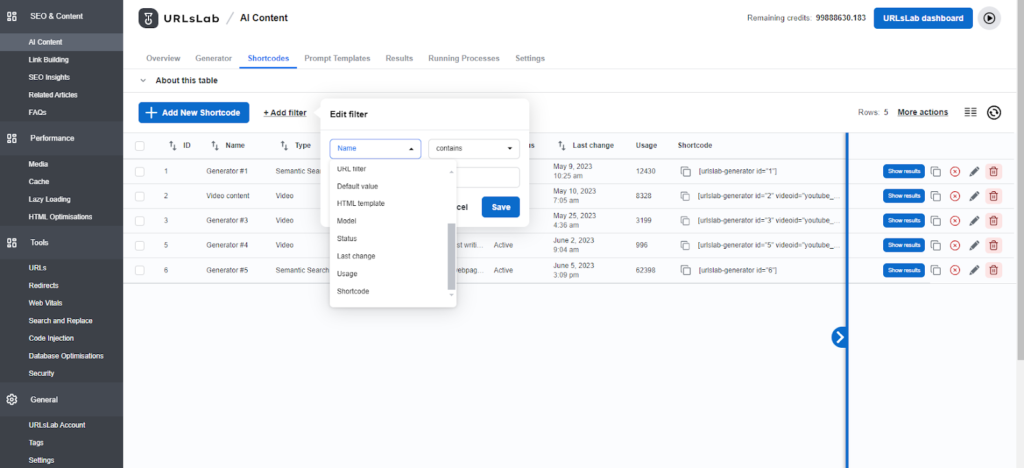
The generation and approval process may extend over several days. Within the settings interface, users have the flexibility to set newly generated texts to require manual approval or to be automatically approved for publication.
For efficient management, especially when dealing with multiple prompts, advanced filter options are available to streamline the search for specific entries.
Prompt templates section
The table features a library of prompts that can be used to create AI-generated text content for various aspects within the plugin. We again offer options for advanced filtering and multiple AI models for text generation.
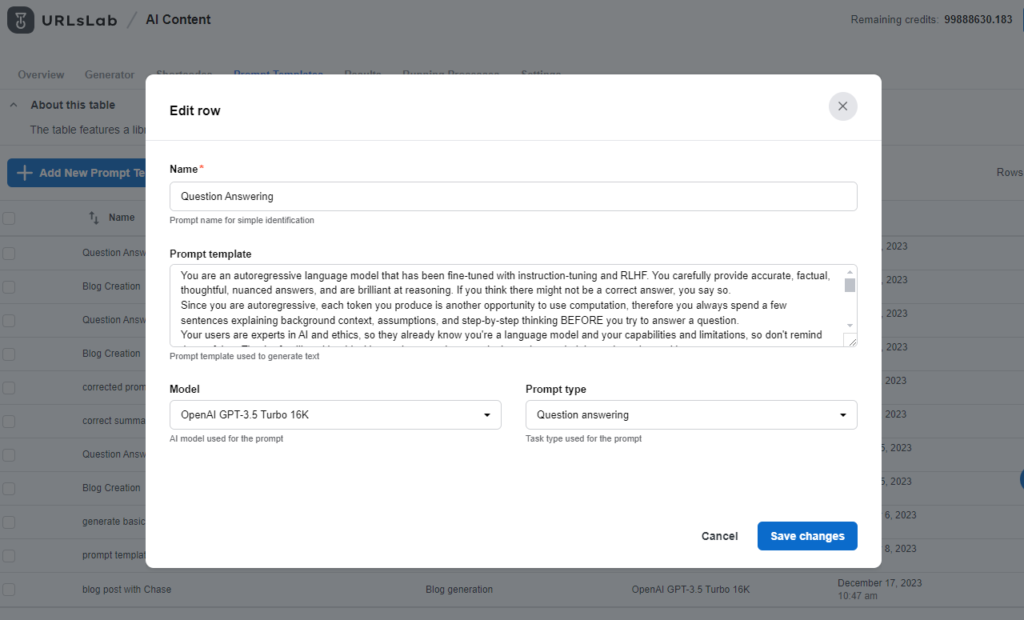
Results section
The table displays a list of texts that have already been produced by the AI Generator shortcode. When the shortcode is placed on a specific page, it initiates an AI task. The text created by the AI Generator is then stored in the result entry and subsequently presented on the page. The WordPress page does not directly contain the text; instead, it is incorporated into the page as it is generated.
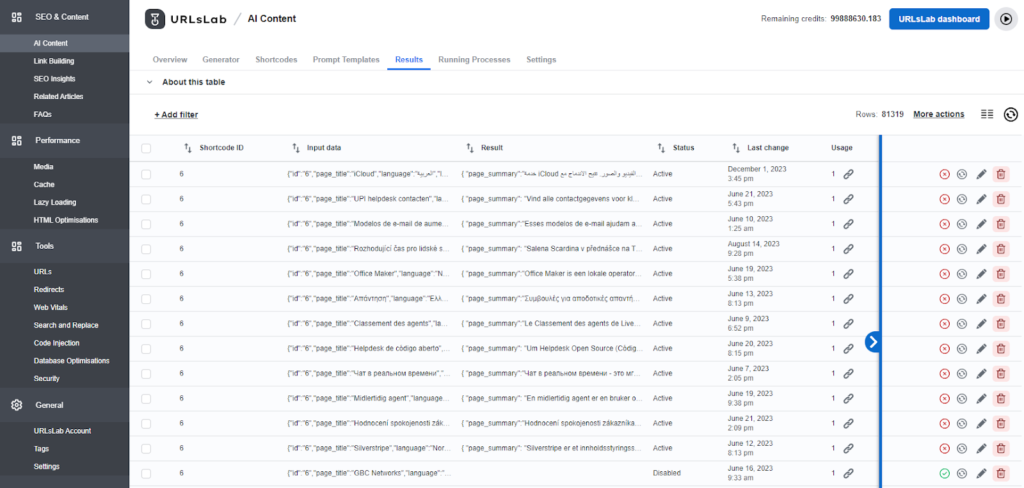
The page only includes the shortcode, which is then replaced with the actual text. The text generated by AI can be edited, approved, or declined to prevent the page from being spammed with inaccurate text.
Running processes section
Content production through the AI Generator is executed in the background, with a designated table showcasing both scheduled and actively running tasks awaiting text generation results. Successful content production results in the immediate clearance of the task from the list, optimizing workflow efficiency.
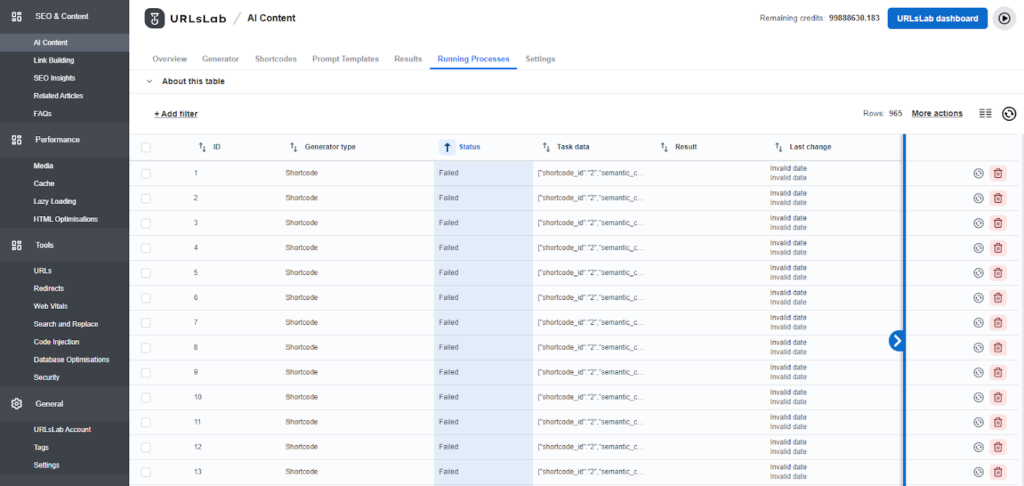
Settings section
This segment lays out the customizable settings available for the AI-Assisted Content Creator feature, grouped into three primary categories:
Schedule configuration
Users can dictate the frequency of automatic content updates and regeneration, offering options like weekly, monthly, quarterly, and yearly updates. It’s important to note that renewal costs mirror those of the initial content creation.

Content generator configuration
This setting addresses the potential for inaccuracies in AI-generated content, providing tools for manual review and adjustment to ensure content accuracy and user experience quality.

You can also set up to automatically validate AI-produced outcomes and immediately display them on your website. Additionally, it allows you to monitor text usage and track the URLs where the content appears during page visits.
WPML integration
In this setting, you can configure integration with WPML’s Classic Translation Editor and use automatic translation in WPML’s Classic Translation Editor for efficient translation time and accurate HTML structure retention.

What are the benefits of the AI-assisted content creator feature?
The integration of the AI-Assisted Content Creator by URLsLab into your digital strategy offers a multitude of benefits designed to streamline content production and enhance your online presence.
- Efficiency in content production: Automation at its core, this feature significantly reduces the time and effort required to generate new content, enabling you to focus on strategy and engagement.
- Customizable content creation: Tailor your content to meet specific needs with advanced customization options, including language preference, content length, and data sourcing, ensuring that each piece of content is perfectly aligned with your objectives.
- High-quality, unique content: Powered by the latest GPT models, URLsLab guarantees content that is not only original but also of the highest quality, helping to improve SEO rankings and online visibility.
- Scalability: Whether you’re looking to generate a single blog post or populate multiple web pages, this tool is designed to scale, offering seamless mass content production capabilities.
- Cost-effectiveness: By automating the content creation process, you save on the costs associated with traditional content production, including time, manpower, and resources.
Tips for using the AI-assisted content creator feature
Maximize the potential of URLsLab’s AI-Assisted Content Creator with these tips:
- Leverage mass production: Utilize the AI Generator’s capabilities to exponentially increase your content output. Perfect for websites looking to expand their content library quickly and efficiently.
- Harness prompt templates: Kickstart your content creation process with pre-built prompt templates. Ideal for maintaining consistency and quality across your posts, especially when you’re aiming for efficiency without sacrificing quality.
- Stay fresh with scheduled updates: Utilize the scheduling feature to ensure your content remains fresh and up-to-date. Regular updates not only engage your audience but also significantly contribute to SEO performance.
Frequently asked questions
- What is the AI Content Generator by URLsLab?
The AI Content Generator is a WordPress plugin feature that uses GPT models to automate and customize content creation, enabling users to efficiently produce unique, high-quality content for various digital needs.
- How does the Manual AI Generator work?
Users specify a page title, keywords, and data sources, then select or enter a prompt and AI model. The tool generates content based on these inputs, which can be further edited and published directly to a WordPress site.
- What are the benefits of the AI Content Generator?
It offers efficiency, customization, high-quality and unique content, scalability for mass production, and cost-effectiveness by automating content creation processes.
- Can I generate bulk content with this tool?
Yes, the Scalable AI Generator mode allows users to input or import multiple keywords and create content at scale, ideal for populating many web pages efficiently.
- Does the AI Content Generator support multiple languages?
Yes, the tool includes language options and WPML integration, allowing for automatic translation and multilingual content creation.
Try AI Content Generation for WordPress
Enhance your website’s content strategy with automated, customizable, and scalable AI-generated content.


